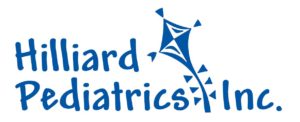RSV, or Respiratory Syncytial Virus, is a common winter virus that can cause infants and young children to develop wheezing, fevers, and difficulty breathing. Each year in the US, RSV leads to over 2 million doctor visits and 50,000 hospitalizations of children (and more in older adult populations). There is typically no treatment for RSV and babies sick enough to be hospitalized often need oxygen until their immune system is able to fight off the virus.
You may have heard, there is a new injectable medicine available to prevent severe RSV illness in infants. This medication, "Beyfortus", gives immunity against the virus, but is not technically a vaccine. As a monoclonal antibody, this medicine gives infection-fighting power to the body directly, by giving antibodies through the shot (which is different from vaccines, which turn on your body's own antibody making power). Babies from birth to 8 months old (and some older babies with chronic health conditions) are eligible for this medication, which can reduce the risk of illness requiring hospitalization from RSV by up to 80%!
Pediatricians all of the country are excited about this shot as we know how much illness, burden, and parental worry RSV can cause. Safety profiles of the medication in the trial were excellent, showing only local reactions to the skin. But, like so many things in modern healthcare, it's complicated. Due to the structure of healthcare coverage and insurance in the US, payors have up to 12 months to decide to cover new vaccines. But remember, this is not a vaccine! So we don't know how much of (or if) this medication will be covered by insurance companies. Even if it is "covered" by your insurance, this may be applied to your deductible rather than covered at 100% like most vaccines. Additionally, those cost to purchase the drug from the manufacturer is very high. All said, this means that families might be responsible for the high cost of this medication if insurance doesn't cover in full. Ugghhh!! We are working on setting a maximum out of pocket that you would be responsible for in any scenario and do not anticipate it to exceed $650 per dose.
Please note, our office is currently out of stock of the larger 100mg dose (babies 11lbs and over) and unfortunately unable to order more at this time. Sanofi, the manufacturer of Beyfortus, issued a statement on Oct 17th stating that demand for the product was much higher than anticipated and no timeline has been provided for when ordering might be able to resume and may not happen this RSV season. This announcement came as quite a shock to Pediatricians accross the country as we were assured inventory would not be a problem. As of right now, Sanofi believes there are still plenty of the smaller (babies under 11lbs) dose available and we are still able to place orders for those, but that may change in the future. Beyfortus will only be administered to patients of Hilliard Pediatrics.
So what now?
- Well, first call, your insurance company. See how much or IF they might cover Beyfortus for your newborn or infant under 8 months of age. If they won't cover it, ask them why not and ask them to change their policy.
- Additionally, if not covered, we recommend reaching out to your HR department to get them to fight on your behalf as well.
- When you call you insurance, they may ask you for CPT codes and possibly a diagnosis code.
- CPT Code - this is based on your child's weight at time of service. It will either by 90380 (under 11 lbs) or 90381 (11 lbs and over). If your child is right around 11 lbs, it may not hurt to ask them to check both.
- Diagnosis Code - for all injection of Beyfortus, the ICD-10 code is Z29.11.
- Secondly, if you have a baby this fall, ask the birth hospital if they are giving this medication to babies before leaving the hospital.
- Third, Call the health department as they might be able to provide some doses of Beyfortus at a lower cost, especially to the under-insured populations.
We will used shared decision making to give this medication to infants who qualify, but will unfortunately need families to understand the cost which might fall on their shoulders. Frankly, we are disappointed that insurance might choose not to cover this and leave the financial responsibility to families. We hope that in a short amount of time, this process can change to allow equal access to RSV prevention. In the meantime, we are excited about this new shot and glad that we will be able to offer this as an option for our patients.
For more information about RSV or Beyfortus, check out the following sites:
